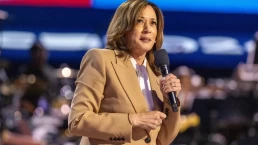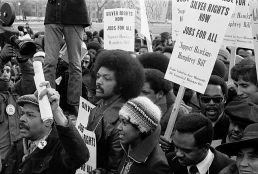If Harris wins, her chief of staff selection will determine whether she maintains a united front, or sides with corporate interests.
By Max Moran, The American Prospect
Democratic Party progressives have largely projected solidarity with Kamala Harris against the greater threat of a second Trump term, despite a campaign pitched directly at the moderate Republican voter. However, her embrace of high-dollar fundraising from the financial and technology industries has prompted consternation. To wonkish lefties, one of the big questions is whether, if elected, Harris will maintain the carefully brokered intra-Democratic detente on economic issues established by her current boss, President Joe Biden.
That will be especially relevant if Democrats manage to gain control of the White House, Senate, and House of Representatives. Under similar conditions a few years ago, with the thinnest of majorities, progressives unexpectedly became Biden’s most loyal allies as he delivered a slew of employment- and worker-focused spending bills and policies nicknamed “Big Fiscal.” Harris’s well-heeled friends from corporate America are dead set against her finishing the business of that brief era, such as by passing the pro-union PRO Act.

So will Harris be Lyndon Johnson or Bill Clinton? Big Fiscal or Big Business? We can’t expect clear answers until after November 5th, but a leading indicator will be one of the most important personnel decisions she’ll make, if elected: her White House chief of staff.
The chief of staff’s duties change from administration to administration, but almost always, they decide what the president gets to see. That makes them a crucial circuit breaker. If the chief of staff doesn’t think you matter, then you won’t get your ideas in front of the president.
We can see how powerful this is by contrasting Biden’s two years of a Democratic trifecta (2021-2022) with Barack Obama’s (2009-2010). Obama’s first chief of staff was Rahm Emanuel, a man who built a career out of blaming the left for his own nonstop failings. During the 2008 transition, Emanuel bullied colleagues within the incoming Obama White House out of even proposing their Plan B stimulus, which they already knew was too small to fill the hole left by the financial crisis. The result was the long, painful Great Recession, which did enormous damage to the Democratic brand.
Recent Posts
‘The Siege Must Be Broken’: Countries Called to Ship Fuel to Cuba After Trump Tariffs Struck Down
February 21, 2026
Take Action Now The US Supreme Court’s ruling “implies that Trump’s recent order imposing tariffs on countries selling oil to Cuba exceeds the…
Elite Depravity in Imperial Decline, A Zero Hour Conversation With Richard Wolff
February 20, 2026
Take Action Now “The system self-selects for psychopathy… the most sociopathically obsessive competitor and accumulator of personal power and…
Economics of Health For All: The Plan to Put Health at the Heart of the Global Economy
February 20, 2026
Take Action Now At the World Health Assembly in May, member states may endorse an unprecedented strategy declaring that health is not a cost – but…
The Left Owes a Lot to Jesse Jackson
February 19, 2026
Take Action Now As a movement builder, spokesperson, and candidate for the presidency, Jesse Jackson’s accomplishments were massive. He was one of…




